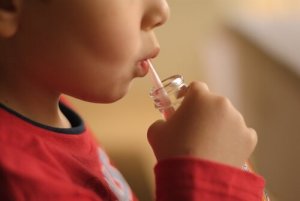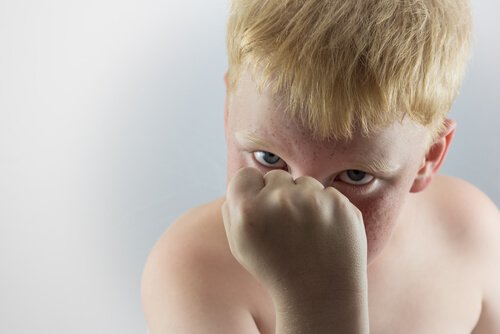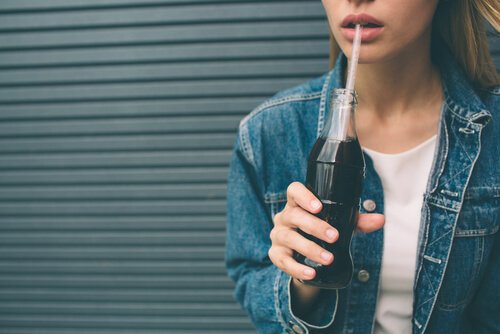The Link Between Soda and Aggressiveness in Children

Many parents may find it strange that soda can increase aggressive behavior in their children. Well, as odd as it may seem, science says it’s true. Several studies have demonstrated the link between soda and aggressiveness in children.
Experts say that there’s a clear link between aggressive behavior in children and their soda intake. But does that include all types of soda? Is it due to the sugar, caffeine, carbon dioxide, and additives they contain or is it a combination of several factors?
Soda, children, and health
We’re slowly becoming aware of the benefits of cutting sugary drinks from children’s diets. Doctors and nutritionists have always claimed that soda provides kids with empty calories that result in higher child obesity rates. Dentists advise against children drinking sugary drinks due to the fact that they’re the main cause of cavities.
Also, many sodas are high in caffeine. Caffeine does so much more than just alter a kid’s mood and make them stay up late. It can cause headaches, stomachaches, nervousness, and trouble falling asleep. It also makes kids prone to behavior problems and nervous system disorders. Caffeine can have these effects on children even in small amounts.

Soda and aggressiveness in children
You should never disregard behavior issues related to soda consumption. A 2013 study published by The Journal of Pediatrics found that aggressiveness, physical dependence, and attention problems are closely linked to soda consumption in young children (Suglia, 2013).
Researchers studied 3,000 5-year-old children from 20 different cities in the United States and discovered that the consumption of soft drinks was related to aggressive behavior.
The scientists tried to isolate the influence of these beverages by eliminating other relevant factors such as depression in the mother, a jailed father, and domestic violence. Also, children who drank four or more glasses of soda in one day were twice as likely to end up destroying other people’s belongings.
The link isn’t very clear
The link between soda and aggressiveness in children isn’t very clear. Due to the fact that sodas are processed products, researchers suspect that ingredients such as aspartic acid or phosphoric acid are behind child behavior problems.
Caffeine can cause child behavior problems as well, so researches think that caffeine content could be part of the problem.
Plus, a high intake of sugary drinks can also affect blood glucose levels. A low blood glucose level in children can make them crave soda and make them aggressive or shy.
The dangers of soda consumption in teens
Several studies have also discovered that soda consumption in teens is associated with behavior and emotional problems. Another study published in the International Journal of Injury Control and Safety Promotion associated soda consumption with aggressiveness, depression, and suicidal behavior in teens (Solnick and Hemenway, 2013).
According to experts, the more soda teens drink, the more likely they are to get into fights. Plus, they found that teens were also more likely to feel depressed or desperate and have suicidal thoughts.

Aggressive behavior can be linked to soda consumption
To put it in just a few words: among the many factors that can make a child aggressive, we can say that soda consumption is a relevant one. In fact, cutting these drinks from your children’s diet can improve their behavior.
Carbonated sugary drinks, soft drinks, processed juices, drinks with caffeine, and energy drinks are very harmful. It’s especially important not to let your kids consume energy drinks, including sports drinks. Many of these beverages contain stimulants such as guarana, taurine, and high amounts of caffeine.
Many parents may find it strange that soda can increase aggressive behavior in their children. Well, as odd as it may seem, science says it’s true. Several studies have demonstrated the link between soda and aggressiveness in children.
Experts say that there’s a clear link between aggressive behavior in children and their soda intake. But does that include all types of soda? Is it due to the sugar, caffeine, carbon dioxide, and additives they contain or is it a combination of several factors?
Soda, children, and health
We’re slowly becoming aware of the benefits of cutting sugary drinks from children’s diets. Doctors and nutritionists have always claimed that soda provides kids with empty calories that result in higher child obesity rates. Dentists advise against children drinking sugary drinks due to the fact that they’re the main cause of cavities.
Also, many sodas are high in caffeine. Caffeine does so much more than just alter a kid’s mood and make them stay up late. It can cause headaches, stomachaches, nervousness, and trouble falling asleep. It also makes kids prone to behavior problems and nervous system disorders. Caffeine can have these effects on children even in small amounts.

Soda and aggressiveness in children
You should never disregard behavior issues related to soda consumption. A 2013 study published by The Journal of Pediatrics found that aggressiveness, physical dependence, and attention problems are closely linked to soda consumption in young children (Suglia, 2013).
Researchers studied 3,000 5-year-old children from 20 different cities in the United States and discovered that the consumption of soft drinks was related to aggressive behavior.
The scientists tried to isolate the influence of these beverages by eliminating other relevant factors such as depression in the mother, a jailed father, and domestic violence. Also, children who drank four or more glasses of soda in one day were twice as likely to end up destroying other people’s belongings.
The link isn’t very clear
The link between soda and aggressiveness in children isn’t very clear. Due to the fact that sodas are processed products, researchers suspect that ingredients such as aspartic acid or phosphoric acid are behind child behavior problems.
Caffeine can cause child behavior problems as well, so researches think that caffeine content could be part of the problem.
Plus, a high intake of sugary drinks can also affect blood glucose levels. A low blood glucose level in children can make them crave soda and make them aggressive or shy.
The dangers of soda consumption in teens
Several studies have also discovered that soda consumption in teens is associated with behavior and emotional problems. Another study published in the International Journal of Injury Control and Safety Promotion associated soda consumption with aggressiveness, depression, and suicidal behavior in teens (Solnick and Hemenway, 2013).
According to experts, the more soda teens drink, the more likely they are to get into fights. Plus, they found that teens were also more likely to feel depressed or desperate and have suicidal thoughts.

Aggressive behavior can be linked to soda consumption
To put it in just a few words: among the many factors that can make a child aggressive, we can say that soda consumption is a relevant one. In fact, cutting these drinks from your children’s diet can improve their behavior.
Carbonated sugary drinks, soft drinks, processed juices, drinks with caffeine, and energy drinks are very harmful. It’s especially important not to let your kids consume energy drinks, including sports drinks. Many of these beverages contain stimulants such as guarana, taurine, and high amounts of caffeine.
All cited sources were thoroughly reviewed by our team to ensure their quality, reliability, currency, and validity. The bibliography of this article was considered reliable and of academic or scientific accuracy.
- Cartwright, M.M. (2013): Do Soft Drinks Really Make Kids More Aggressive. Phycology Today. Recuperado de https://www.psychologytoday.com/us/blog/food-thought/201308/do-soft-drinks-really-make-kids-more-aggressive
- Solnick S.J y Hemenway D. (2013): Soft Drinks Aggression y Suicidal Behaviour in US High School Students. International Journal of Injury Control and Safety Promotion, 21(3), 266-273. doi: 10.1080/17457300.2013.815631
- Suglia S.F, Solnick S. y Hemenway D. (2013). Soft Drinks Consumption Is Associated With Behavior Problems in 5-Year-Olds. The Journal of Pediatrics, 163(5), 1323-1328.
This text is provided for informational purposes only and does not replace consultation with a professional. If in doubt, consult your specialist.







